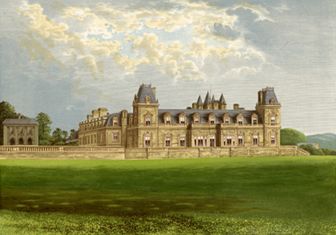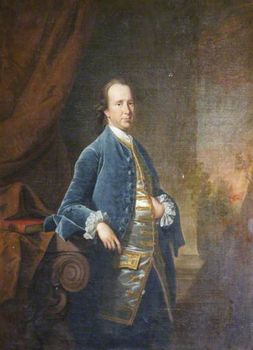|
Pill, Bishop's Tawton
Pill (''alias'' Pille, Pylle, etc.) is an historic estate in the parish of Bishop's Tawton, near Barnstaple, in North Devon, England. The surviving 18th-century mansion house known as Pill House is a grade II* listed building situated close to the east bank of the River Taw about 1 mile south of the historic centre of Barnstaple and 1 mile north of Bishop's Tawton Church. It was long a seat of a junior branch of the Chichester family of Hall, Bishop's Tawton. At some time before 1951 it was converted into apartments and is at present in multiple occupation. Descent de la Pille The earliest recorded holder of the estate according to the Devon historian Sir William Pole (d.1635) was the de la Pille family, which took its name from the estate. Successive holders were: *John de la Pille *Benedict de la Pille *Michaell de la Pille ( fl. 1315), who left his daughter as his sole heiress, who married Robert Fulk of Halmeston (mod: Halmpstone), Bishop's Tawton, to which family passed Pi ... [...More Info...] [...Related Items...] OR: [Wikipedia] [Google] [Baidu] |
Arms Of Chichester
Arms or ARMS may refer to: *Arm or arms, the upper limbs of the body Arm, Arms, or ARMS may also refer to: People * Ida A. T. Arms (1856–1931), American missionary-educator, temperance leader Coat of arms or weapons *Armaments or weapons **Firearm **Small arms *Coat of arms **In this sense, "arms" is a common element in pub names Enterprises *Amherst Regional Middle School *Arms Corporation, originally named Dandelion, a defunct Japanese animation studio who operated from 1996 to 2020 *TRIN (finance) or Arms Index, a short-term stock trading index *Australian Relief & Mercy Services, a part of Youth With A Mission Arts and entertainment *ARMS (band), an American indie rock band formed in 2004 * ''Arms'' (album), a 2016 album by Bell X1 * "Arms" (song), a 2011 song by Christina Perri from the album ''lovestrong'' * ''Arms'' (video game), a 2017 fighting video game for the Nintendo Switch *ARMS Charity Concerts, a series of charitable rock concerts in support of Action into Re ... [...More Info...] [...Related Items...] OR: [Wikipedia] [Google] [Baidu] |
Tristram Risdon
Tristram Risdon (c. 1580 – 1640) was an English antiquarian and topographer, and the author of ''Survey of the County of Devon''. He was able to devote most of his life to writing this work. After he completed it in about 1632 it circulated around interested people in several manuscript copies for almost 80 years before it was first published by Edmund Curll in a very inferior form. A full version was not published until 1811. Risdon also collected information about genealogy and heraldry in a note-book; this was edited and published in 1897. Biography Risdon was born at Winscott, in the parish of St Giles in the Wood, near Great Torrington in Devon, England. He was the eldest son of William Risdon (d.1622) and his wife Joan (née Pollard).Mary Wolffe''Risdon, Tristram (c. 1580–1640)'' Oxford Dictionary of National Biography, Oxford University Press, 2004. Accessed 7 February 2011. (Subscription required) William was the younger son of Giles Risdon (1494–1583) of Bableig ... [...More Info...] [...Related Items...] OR: [Wikipedia] [Google] [Baidu] |
Theosophist
Theosophy is a religion established in the United States during the late 19th century. It was founded primarily by the Russian Helena Blavatsky and draws its teachings predominantly from Blavatsky's writings. Categorized by scholars of religion as both a new religious movement and as part of the occultism, occultist stream of Western esotericism, it draws upon both older European philosophies such as Neoplatonism and Asian religions such as Hinduism and Buddhism. As presented by Blavatsky, Theosophy teaches that there is an ancient and secretive brotherhood of spiritual adepts known as the Masters of the Ancient Wisdom, Masters, who—although found around the world—are centered in Tibet. These Masters are alleged by Blavatsky to have cultivated great wisdom and supernatural powers, and Theosophists believe that it was they who initiated the modern Theosophical movement through disseminating their teachings via Blavatsky. They believe that these Masters are attempting to revive ... [...More Info...] [...Related Items...] OR: [Wikipedia] [Google] [Baidu] |
Clara Codd
Clara Margaret Codd (10 October 1876 – 3 April 1971) was a British writer, suffragette, socialist feminist, and theosophist. She went to jail for the suffragettes and then devoted her life to the Theosophical Society. Life Codd was born in Bishops Tawton at Pill House in 1876. She was the first child of Henry Frederick Codd and Clara Virginia (née Botto) Codd. She had nine siblings and she was taught at home by a fair number of governesses. At the age of fifteen she became an atheist. After her father's death the family moved to Geneva where Codd herself worked as a governess, a costume model and she travelled to play the violin and piano. She was converted to Theosophy after hearing the first President of the Theosophical Society, Henry Steel Olcott, give a talk in Geneva.Heloise Brown, "Codd, Clara Margaret (1876–1971)", ''Oxford Dictionary of National Biography'', Oxford University Press, 2004; online edn, September 201accessed 30 October 2017/ref> Codd planting tre ... [...More Info...] [...Related Items...] OR: [Wikipedia] [Google] [Baidu] |
John Rolle, 1st Baron Rolle
John Rolle, 1st Baron Rolle (1750 – 3 April 1842) was a British peer who served as a Member of Parliament in general support of William Pitt the Younger and was later an active member of the House of Lords. His violent attacks on Edmund Burke and Charles James Fox in the early 1780s led to his being the target for satirical attack in the '' Rolliad''. He was colonel of the South Devon Militia and was instrumental in forming the Royal 1st Devon Yeomanry and the North Devon Yeomanry. He was a slave owner. At Emancipation he presented his estate on the island of Exuma in the Bahamas in perpetuity to his freed slaves, whose descendants still lived in what became known as Rolleville as late as the 1920s. He was the largest landowner in Devon, with about 55,000 acres centred on his seats of Stevenstone in the north and Bicton House in the south-east, and thus was highly influential in that county. He promoted and financed several large engineering projects, including the ... [...More Info...] [...Related Items...] OR: [Wikipedia] [Google] [Baidu] |
Great Torrington
Great Torrington (often abbreviated to Torrington, though the villages of Little Torrington and Black Torrington are situated in the same region) is a market town in Devon, England. Parts of it are sited on high ground with steep drops down to the River Torridge below, with the lower-lying parts of the town prone to occasional flooding. Torrington is in the centre of Tarka Country, a landscape captured by Henry Williamson in his novel ''Tarka the Otter'' in 1927. Great Torrington has one of the most active volunteering communities in the United Kingdom. In July 2019, Great Torrington was reported to be the healthiest place to live in Britain. Researchers from the University of Liverpool found that the area had low levels of pollution, good access to green space and health services, along with few retail outlets. History There were Iron Age and medieval castles and forts in Torrington, located on the Castle Hill. Great Torrington had strategic significance in the English ... [...More Info...] [...Related Items...] OR: [Wikipedia] [Google] [Baidu] |
Stevenstone
Stevenstone is a former manor within the parish of St Giles in the Wood, near Great Torrington Great Torrington (often abbreviated to Torrington, though the villages of Little Torrington and Black Torrington are situated in the same region) is a market town in Devon, England. Parts of it are sited on high ground with steep drops down to ..., North Devon. It was the chief seat of the Rolle family, one of the most influential and wealthy of Devon families, from c. 1524 until 1907. The Rolle estates as disclosed by the Return of Owners of Land, 1873 (corrected by Bateman's 'Great Landowners' (1883), Bateman, 1883) comprised 55,592 acres producing an annual gross income of £47,170, and formed the largest estate in Devon, followed by the Francis Russell, 9th Duke of Bedford, Duke of Bedford's estate centred on Tavistock, Devon, Tavistock comprising 22,607 with an annual gross value of nearly £46,000. From the Glorious Revolution of 1688 to the Reform Act of 1832 the coun ... [...More Info...] [...Related Items...] OR: [Wikipedia] [Google] [Baidu] |
Denys Rolle (died 1797)
Denys Rolle (1725 – 1797) of Hudscott, Beam, Stevenstone and Bicton in Devon and East Tytherley in Hampshire, was an independent Member of Parliament for Barnstaple, Devon, between 1761 and 1774. He inherited a large number of estates and by the time of his death he was the largest landowner in Devon. He was a philanthropist and generous benefactor to charities and religious societies. He spent much of his life in Florida attempting to establish an "ideal society", a Utopian colony of poor, homeless or criminal English persons named Rollestown or Charlotta. The project was a failure and Rolle recorded his colonial adventure in great detail in a lengthy official complaint made in 1765 to the British government entitled ''The Humble Petition of Denys Rolle, Esq., Setting Forth the Hardships, Inconveniences, and Grievances Which Have Attended Him in His Attempts to Make a Settlement in East Florida, Humbly Praying Such Relief as in their Lordships Wisdom Shall Seem Meet''. His ... [...More Info...] [...Related Items...] OR: [Wikipedia] [Google] [Baidu] |
Manorialism
Manorialism, also known as the manor system or manorial system, was the method of land ownership (or "tenure") in parts of Europe, notably France and later England, during the Middle Ages. Its defining features included a large, sometimes fortified manor house in which the lord of the manor and his dependents lived and administered a rural estate, and a population of labourers who worked the surrounding land to support themselves and the lord. These labourers fulfilled their obligations with labour time or in-kind produce at first, and later by cash payment as commercial activity increased. Manorialism is sometimes included as part of the feudal system. Manorialism originated in the Roman villa system of the Late Roman Empire, and was widely practiced in medieval western Europe and parts of central Europe. An essential element of feudal society, manorialism was slowly replaced by the advent of a money-based market economy and new forms of agrarian contract. In examining the o ... [...More Info...] [...Related Items...] OR: [Wikipedia] [Google] [Baidu] |
Swimbridge
Swimbridge (historical spelling: ''Swymbridge'') is a village, parish and former manor in Devon, England. It is situated south-east of Barnstaple and twinned with the town of St.Honorine Du Fay in Normandy, France. It was the home of the Rev. John "Jack" Russell who first bred the Jack Russell Terrier. Etymology The manor is called ''Birige'' in the Domesday Book of 1086, when it was held in-chief from King William the Conqueror by an Anglo-Saxon priest named Sawin (or Saewin), whose uncle Brictferth had held it before the Norman Conquest of 1066. The honour of being a tenant-in-chief in feudal times was generally restricted to great warriors and close followers of the king, but Sawin was given this land in alms by Queen Matilda, wife of William the Conqueror. It was probably part of the royal manor of South Molton, and Sawin was probably one of the priests at South Molton. It thenceforward became known as "Sawain's Birige" which eventually transformed into "Swimbridge". De ... [...More Info...] [...Related Items...] OR: [Wikipedia] [Google] [Baidu] |



_(LOC)_(16333586239).jpg)



